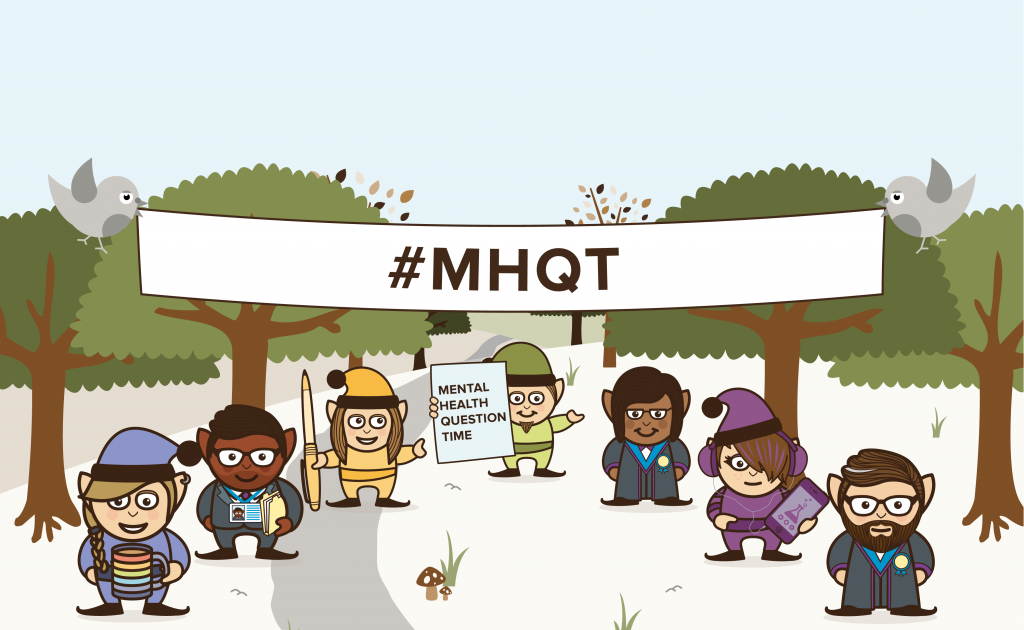
One of our key aims with the Mental Elf is to provide a safe, friendly and professional space for people to discuss mental health issues, and specifically the latest relevant and reliable research. We really want people to learn about good quality research and improve patient care as a result. It still takes about 10 years for new health evidence to get into practice and this clearly needs to change.
We’ve found that blogs, social media, webinars and podcasts have all been great ways to share new mental health evidence and facilitate democratic discussions about important knowledge that should be changing frontline practice. Our digital exploits have worked best when we’ve brought together a diverse range of people, including those with lived experience of mental illness, nurses, clinicians, researchers, policy makers and all kinds of other health and social care professionals.

Discussions about mental health evidence really do work best with all the right people involved.
Working with like-minded humans
This week we are launching a new series of public discussions that will take place in the digital elf world, but also in the face-to-face world of humans. Just imagine our excitement!
As with everything else we do, these new Mental Health Question Time events are a partnership between us and other like-minded people and organisations. We are really excited to be working on this venture with Sonia Johnson and her colleagues at the UCL Division of Psychiatry and Niall Boyce, Editor of The Lancet Psychiatry.

Mental Health Question Time is a partnership between elves and humans!
Public discussions not debates
We all love a good bun fight, but when the bluster has subsided and the clever academic point-scoring has faded in the memory, are we really any closer to resolving anything or improving the lives of people experiencing mental health difficulties? In our experience, debates are often entertaining, but they are rarely inclusive or practically valuable.
Our shared goal with this new series of public discussions is to bring together a diverse range of people and provide a forum for thoughtful and constructive conversation. Of course, it will be a conversation happening in a room full of hundreds of people, with lots more joining in via social media, but we hope to create a welcoming and supportive atmosphere that engenders useful conversation.
Dementia: care or cure? 9/11/16 6-7pm
Resources are limited and dementia research should therefore focus on caring not curing.
Our first Mental Health Question public discussion is taking place in London at 6-7pm on Wednesday 9th November 2016. Everyone is welcome and tickets are free. You can find out more on the website and book your tickets on our Eventbrite page.
Here’s an introduction from our chair Professor Gill Livingston:
Dementia has been characterised as a ticking bomb, the 21st century epidemic, impacting on individuals, their families and society and costing the global economy £350 billion. The UK PM Challenge on Dementia 2020 aims to accelerate progress towards a disease modifying therapy, and a dementia cure by 2025. Nonetheless people living with dementia are currently offered management to improve symptoms and their lives, but there are no disease modifying treatments or cures for the different dementias.
In this interactive Mental Health Question Time, a family carer, a voluntary sector leader, a journal editor, health economist and doctors of different backgrounds will give their perspectives on whether scarce resources for research should focus exclusively on finding cures.
Our expert panel
-
Gill Livingston (Chair), University College London
-
Caitlin Aspinall, The Lancet Neurology
-
Nick Fox, Institute of Neurology
-
Gillian Harrison, Alzheimer’s Society Research Network
-
Rob Howard, University College London
-
Valentina Iemmi, London School of Economics
- Naheed Mukadam, UCL Psychiatry
-
James Pickett, Alzheimer’s Society
Future #MHQT events
We are planning to run Mental Health Question Time public discussions in London every 3 months and welcome suggestions for topics to cover. You can email us at: talk@mentalhealthquestiontime.net or find our more on the Mental Health Question Time website.
Topics currently under consideration include:
- Women’s mental health
- Digital mental health
- Loneliness and social determinants of mental health


It’s Mental Health Question Time! #MHQT https://t.co/Cj3FTWjZbm
It’s Mental Health Question Time! #MHQT
Join us on Wed 9 Nov 6pm
#Dementia: care or cure?
FREE public discussion… https://t.co/jRakYWb6C4
RT @UCLPsychiatry: Introducing Mental Health Question Time #MHQT – a partnership between @uclpsychiatry @Mental_Elf & @TheLancetPsych http…
#MHQT: in an argumentative world, we’re trying to have a discussion. Please join us. @Mental_Elf @UCLPsychiatry https://t.co/CWSZK3m0Q0
@TheLancetPsych @MentalhealthMSc @Mental_Elf @UCLPsychiatry Excellent.
It’s Mental Health Question Time! #MHQT https://t.co/ALOeraOtHF
I learned quite a few things in here.